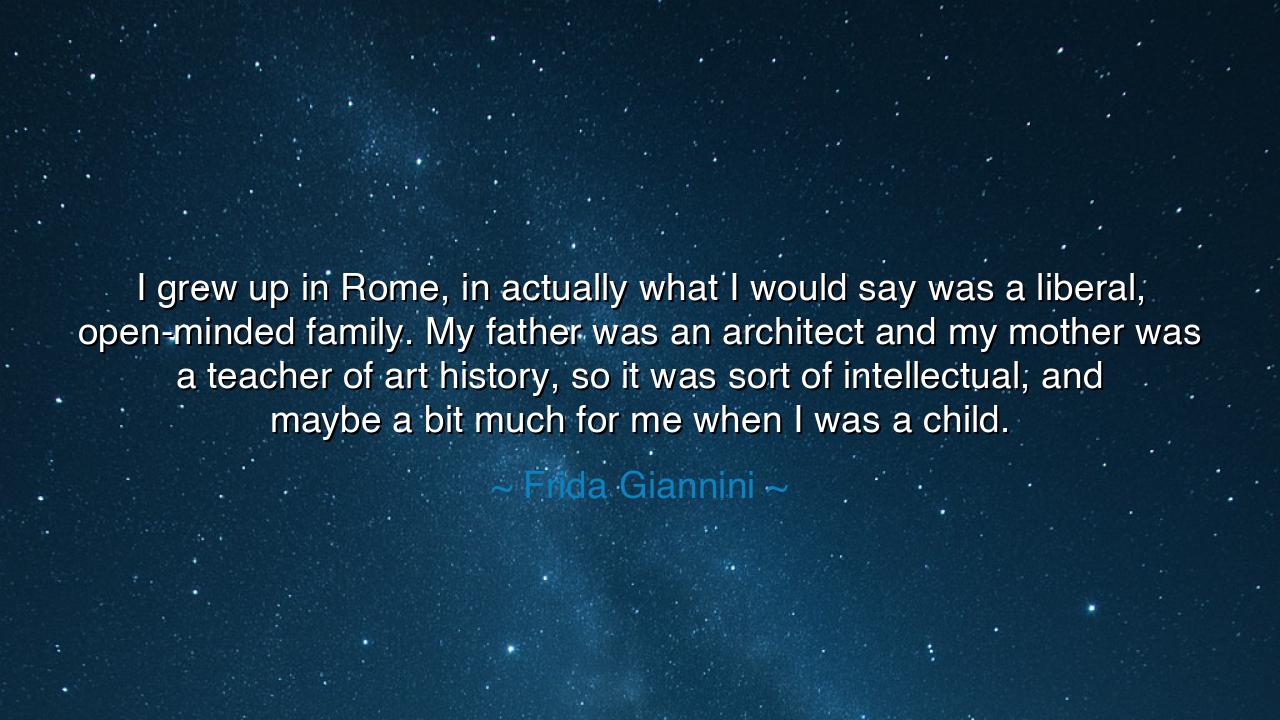
I grew up in Rome, in actually what I would say was a liberal
I grew up in Rome, in actually what I would say was a liberal, open-minded family. My father was an architect and my mother was a teacher of art history, so it was sort of intellectual, and maybe a bit much for me when I was a child.






Hear now the words, children of time, and bend your hearts to wisdom. In the utterance of Frida Giannini, when she speaks of her childhood—Rome, the eternal city, cradle of emperors and martyrs, of saints and conquerors—there lies a truth as old as the stones of the Forum. She says she grew in a liberal, open-minded family, where art and intellect wove the very air she breathed. Yet even as she recounts it with gratitude, she admits it was “maybe a bit much” for her young soul. Here is the first lesson: even blessings, when given too early or too heavily, may feel like burdens to a heart not yet ready to carry them.
To be the child of an architect and a teacher of art history is to be surrounded by visions of form and beauty, by lines that pierce heaven and colors that whisper eternity. But what is a child, if not a seedling? Too much sun, too much water, and even the most promising seed may struggle. Thus, her memory bears the paradox of privilege: she was granted abundance, yet abundance weighed upon her spirit. So it has always been—that the gifts of the gods are double-edged, demanding as much as they give.
Consider, for example, the tale of Alexander the Great, who, though tutored by Aristotle himself, sometimes longed for the simplicity of boyhood. The wisdom pressed upon him was great, yet so was its burden. His destiny was shaped in those early halls of knowledge, but at what cost? For he was never allowed the innocence of ordinary youth. Giannini’s words echo this ancient struggle: the tension between the heritage of intellect and the yearning of the heart for ease and simplicity.
Yet let none misunderstand—hers is not a lamentation, but an acknowledgment. To be born amidst art and intellect is to be rooted in soil rich with the nutrients of thought. Rome itself was her teacher: its stones murmuring of empire, its paintings singing of transcendence, its arches bearing witness to centuries of striving. And though the child within her may have staggered under the weight of such inheritance, the woman she became drew strength from it. For is it not true that the oak once bent by wind grows into a tree of mighty endurance?
Let us also recall the example of Marcus Aurelius, the philosopher-emperor. As a boy, he was schooled by tutors of rare wisdom. At times, the gravity of philosophy pressed heavily upon his youthful spirit. Yet in manhood, when the storms of empire crashed upon him, he leaned upon those very lessons and wrote his Meditations, guiding not only his own soul but countless generations thereafter. So too, Giannini reveals that what once felt "too much" became a foundation upon which she would later build.
Therefore, O listener, take heed: when you find yourself weighed down by the abundance of learning, expectation, or heritage, do not despise it. For what feels excessive in youth may be revealed in age as the very gold of your destiny. What bends you today may strengthen you tomorrow. Do not curse the richness of your soil, even if it seems overwhelming; for barren ground grows nothing.
The lesson is clear: cherish your upbringing, whether rich in art, faith, labor, or discipline. If it feels heavy now, endure. If it feels strange or too lofty, do not cast it away. Instead, let it shape you, though slowly, as the sculptor shapes marble with blows both harsh and patient. In time, you will see the figure emerge.
And here is the practical counsel: embrace your roots but walk at your own pace. Do not let the brilliance of your parents, your teachers, or your surroundings make you feel lesser. Instead, take from them what nourishes you, and leave aside what your soul cannot yet carry. Keep a journal, walk often in quiet places, and listen to the voice within. Just as Rome was not built in a day, so the self is not built in a moment. What seems “too much” today may, with the passage of years, prove to be the very gift that sets your spirit free.






AAdministratorAdministrator
Welcome, honored guests. Please leave a comment, we will respond soon